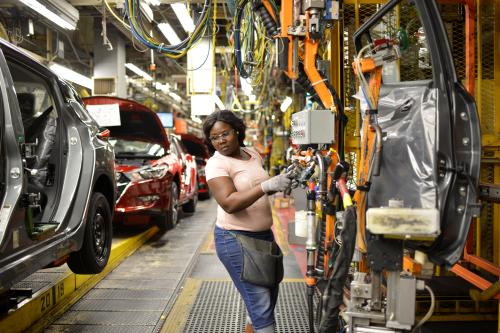This paper was prepared for the December 8, 2020, conference on the Future of Automation and the Middle Class for the Brookings Institution, Future of the Middle Class Initiative.
Despite persistent fears that robots and computers are coming for our jobs, most labor market experts agree that fears (or hopes) for a future where work will be optional, or worse, extremely scarce due to technological change are unlikely. In rare instances, such as the elevator operator, jobs will be rendered completely obsolete. Most jobs, however, will still exist even if fundamentally changed in both task content and form. Technological change will create new tasks and jobs as well.
The productivity and efficiency gains of technological change will be a net positive for society. However, this does not mean we have no reason for concern. First, the availability of work for all who seek it is a precondition for a prosperous and equitable society. Advances in automation and AI have the potential to magnify many of the challenges currently facing our society: income and wealth inequality, concentration of corporate power, reduced upward mobility, and persistent disability, gender, and racial discrimination. Mitigating potential negative tradeoffs of technological change will require new public policy paradigms to ensure that the most at-risk segments of the population are not left even further behind.
To that end, the Future of the Middle Class Initiative at Brookings hosted an event exploring these topics. A two-part panel first considered the role and design of social insurance programs and second, discussed how to foster social mobility and ensure equity of opportunity in the face of automation. The panelists identified key public policy challenges in a technology-driven economy and offered potential non-incremental solutions to best support low and middle-income Americans.
Panel 1: Optimal Social Insurance Design in an Automated Future
The first panel, “Social Insurance in an Automated Future,” featured comments from Diana Farrell, founding President & CEO of the J.P. Morgan Chase Institute, Michael Strain of the American Enterprise Institute, Byron Auguste, CEO and cofounder of Opportunity @ Work, and Marcus Casey, Associate Professor of Economics at the University of Illinois at Chicago and a Nonresident Fellow in Economic Studies at Brookings. The key unifying question: “suppose it is 2050 and all routine tasks have been automated, how we can optimally design social insurance so as to insure well–being but also not disincentivize skill acquisition and work?” The panel agreed that social insurance should not be aimed at long-term replacement of income streams, such as Universal Basic Income (UBI). Instead, the focus should be on redesigning systems to help them efficiently meet the needs of workers. Accordingly, the panelists offered four key policy solutions:
- The social insurance system of the future should take advantage of the improved technology to automate workers’ ability to use their benefits in real time. In an increasingly automated world, it might also be useful to rethink some aspects of federalism, particularly in the context of the provision of social insurance. As the pandemic has shown, the fragmented nature of the social insurance model leaves workers in some states waiting months for assistance. A more streamlined social insurance system—in which individuals automatically receive benefits while unemployed—will allow people to focus on their futures rather than interacting unnecessarily with the social services system.
- The panelists also highlighted to importance of inequality, both income and wealth, and how the future technology–driven labor market might exacerbate its consequences. Diana Farrell suggested shifting focus away from incremental policies, such as providing unemployment insurance payments or targeted housing subsidies, to a more comprehensive system. She suggests that the social insurance system of the future should feature tools that foster financial self-insurance and help middle- and working-class households save and invest.
- The panel further advocated for incorporating reskilling programs in the social insurance system by taking advantage of the advances made in delivery technology. In addition to providing financial benefits to those in need, the social insurance system can help displaced workers acquire new skills to aid their transition back into the workforce. Currently, the social insurance system is not equipped to support workers in this way; instead, workers face the opportunity cost of missing out on employment and income if they choose to participate in training programs. The social insurance system can mitigate this challenge by supporting individuals through training programs and ensuring that they have the opportunity to develop the right skills and talents needed in an automated economy.
- The panel concluded with a discussion of how private and public sector interests can be combined to better help workers achieve and maintain middle–class incomes even in the face of technological change. Ms. Farrell noted that policymakers should design appropriate incentives that encourage employers to invest in their workforce and enable lifelong learning. Employers should be expected to train up their employees such that workers acquire skills on the job. Dr. Auguste echoed this idea by advocating for employers to better recognize skills gained through work, rather than exclusively focusing on credentials. He suggested that the private sector of the future should rethink existing hiring practices and place more emphasis on a worker’s abilities rather than solely their highest degree, which will allow for more movement within the labor market.
Panel 2: Ensuring Equitable Distribution of Opportunity in a Technology-Driven Future
The second panel, “Opportunity and Equity,” included NY Times columnist Kara Swisher, Senior Fellow in Governance Studies and Director of the Center for Technology Innovation Nicol Turner Lee, and Peter Blair, an Assistant Professor at the Harvard University Graduate School of Education. They considered the role of private and public institutions in ensuring opportunities and resources would be equitably distributed given current inequalities. Without substantial commitment by both market leaders and policymakers, such inequalities are likely to expand rapidly in the future. In this conversation, three key suggestions were made:
- Markets need to better recognize workers who are skilled through alternative routes—or, as Dr. Blair calls them, STARs. He shared that nearly 75 million workers in the United States have high school diplomas but have yet to complete a college degree. In the past 40 years, most job growth has been in sectors dominated by college-educated workers. This concentrates economic opportunities for those with a college education, and this is important through a racial equity lens: Black Americans are less likely to have a college education than their white counterparts. This has excluded them from higher-wage positions and has contributed to less upwards social mobility experienced by Black Americans. Typical policy solutions suggest a college-for-all approach, but as Dr. Blair notes, ensuring that every worker has a degree is largely infeasible. Instead, the market should focus on evaluating workers based on their acquired skills, which may subsequently open doors to opportunity—particularly for traditionally disadvantaged populations.
- Kara Swisher, drawing upon her extensive work covering the tech sector, reinforced this point. She called for a rethinking of the evaluation paradigm, arguing that there has been an overemphasis on “talentism” in private labor markets, a word she coined to illustrate the idea that there is an overemphasis on manifesting extraordinary talent as a prerequisite for upward mobility. She continued to say that more pressure should be placed on large companies to reform their hiring practices and place diversity at the top of their priority lists. Otherwise, employers will continue to operate what she calls a “mirror-ocracy.” That is, they will only recognize and hire what they want to see: reflections of themselves.
- If there is going to be greater investment in retraining programs, there must first be investment in broadband services across the country, or, as Nicol Turner Lee suggests, a “New Tech Deal.” As the world becomes increasingly virtual, many retraining programs will be offered online, but the 19 million Americans who live without stable broadband service are at risk of being left behind. This is especially true for Black Americans who are less likely than their white peers to have stable broadband service. Moreover, if education remains (at least partially) virtual, children without access to broadband will fall behind in their learning. The pandemic has started to reveal this issue and its adverse effects on vulnerable populations: on average, Black children may fall 10.3 months behind in learning. In the next decade, as these children start to enter the labor market, they will have fewer opportunities than their white, more advantaged peers. In a world that is expected to see competition rise for well-paying positions, the prospects for Black and other traditionally disadvantaged groups may be bleak without substantial ongoing investments.
Conclusion: Preparing for an Automated Future
Taken together, the two panels emphasize principles for ensuring wellbeing and equitable opportunity for all in a technologically–driven future. The viability of this system will require substantial public policy engagement to revise our social infrastructure, including a social insurance system that provides sufficient, comprehensive, and timely assistance for workers displaced by technological change. It will also require more concentration on ensuring equitable pre-market resources to vulnerable communities.
It is clear that policymakers, private sector organizations, and businesses will need to partner to develop consensus on the appropriate path forward. We have worked on a number of these issues over the past two years, please visit the Future of the Middle Class Initiative site to find more information on the various public and private conferences, research papers, and podcast conversations exploring this topic.
The Brookings Institution is committed to quality, independence, and impact.
We are supported by a diverse array of funders. In line with our values and policies, each Brookings publication represents the sole views of its author(s).







Commentary
Opportunity, policy, and the future of automation
December 21, 2020